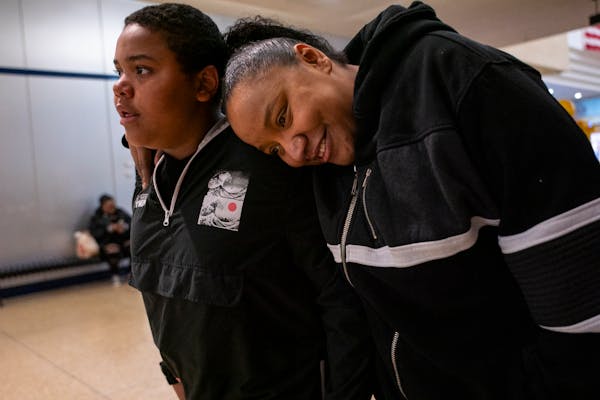Isaiah Gatimu was the family handyman and gofer, a happy-go-lucky kid who helped out around the house and looked out for his single mom and his younger sister, Ashley. He loved basketball, his church and hanging out with his best friends.
But when Gatimu, 19, took his own life on Aug. 5, he was anxious about an upcoming mediation over allegations that a small group of his classmates had harassed and taunted him almost daily the previous school year.
"I think he was reliving it all in his head every day," as the hearing with the Minnesota Department of Human Rights approached, said his mother, Correen Gatimu. "But he was looking forward to moving on."
The Gatimus filed charges with the department in January 2013, alleging that Isaiah, who is biracial, had been called names, assaulted and threatened almost nonstop from the time he entered his senior year at Greenway High School in Coleraine.
Correen also said she and Isaiah spoke to counselors or the school's principal several times over those six months, and that the high school never punished any of the kids or stopped the abuse.
Discrimination charges to the department are not public until a ruling is made. But the Gatimus gave me a copy of their complaint, and the high school's response, after Isaiah committed suicide. (The district's attorney did not return calls.)
The school district acknowledged in the document that Isaiah "was called racially motivated names" and that it had been reported to school officials. But it also said he "was complicit in the name-calling and his behavior is also the focus of the school district's investigation."
The school district forwarded claims of discrimination to the Itasca County attorney's office to determine whether any criminal charges were warranted. The attorney's office told Correen Gatimu there was not enough evidence to charge anyone, she said.
Furthermore, the school district's attorney said in his response that the district "believes that this charge is in part motivated as an act of retaliation by charging party because her son had been expelled by school district for 12 months because of drug violations."
Correen said that expulsion happened in ninth grade, when Isaiah sold a relative's heart medication, saying it was another drug.
She acknowledges Isaiah had some behavioral problems and spent some time in a group home. But she said he had gone to a juvenile boot camp and "was straightened out."
If they wanted to retaliate against the district, they would not have sent him back to the school and kept Ashley in the district, Correen said.
The mediation was scheduled for Aug 18. For Isaiah, however, there will be no resolution. His funeral, attended by a small group of family and friends, took place not far from the school he once feared attending.
"It was such a struggle to get him to go to school," his mother said. "He often cried when he came home."
Correen Gatimu said it's difficult to know everything that motivates a person to commit suicide, but she believes lingering memories of abuse played a big part.
"I think he was starting to look at people and say, 'Oh, you hate me, too,' " she said.
Correen said Isaiah, who moved to Taconite in the fourth grade, was always teased for being different. His father was from Kenya and had returned home.
"It really started to escalate senior year," Correen said. "It went from verbal abuse to physical abuse."
The harassment came from a small group of boys, but it was intense. In his testimony, Isaiah said some of his classmates tried to get them to stop, but it continued until he transferred to another school.
Correen said Isaiah reported almost daily racial epithets from the first day of school. The boys physically kept him from using the drinking fountain, knocked the books out of his arms repeatedly, put him in headlocks and pushed him up against the wall. They reportedly said they would "hang you like your ancestors" and later threatened him when he told the school counselor.
The taunts are backed up by some of his friends in letters to the Gatimus' Minneapolis attorney, Lori Peterson.
"They shoved his books to the ground, kicked them around and made him pick them up himself," wrote one student. "It happened daily."
Peterson, who has been representing the family for more than a year, was stunned by the death, and is considering a lawsuit.
Isaiah's mother said she decided to speak out "to open some eyes. I can't believe this is happening in 2014."
Correen said she gave up dealing with the school after the principal told Isaiah he should "look the other way" when harassed, something the school denied in its response.
"My fault was leaving him there that long," Correen said. "I had faith in the school. I had faith in the system."
jtevlin@startribune.com •
Follow Jon on Twitter: @jontevlin

Tevlin: 'Against all odds, I survived a career in journalism'

Tevlin: Grateful Frogtown couple fight their way back from fire and illness




